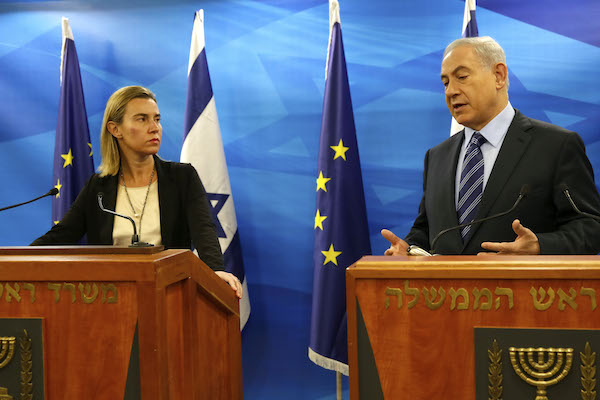Legislative attacks on EU funding of human rights activities could backfire by forcing the Europeans to revisit the basis for its entire economic relationship with Israel — something that not even BDS has succeeded at accomplishing.

The Israeli Right is once again seeking to introduce legislation that would limit the ability of human rights and anti-occupation organizations to seek funding abroad. As part of coalition negotiations with Prime Minister Netanyahu, Naftali Bennett’s Jewish Home party is demanding that foreign-government funding of local institutions require approval by the Defense Ministry and the Knesset’s powerful Foreign Affairs and Defense Committee. The next government is unlikely to adopt Bennett’s demand as policy, but some softer version may very well reach the Knesset floor, and even gain the necessary majority to become law.
The right-wing media is already preparing the ground. Right-leaning newspaper Makor Rishon (now owned by Jewish American billionaire Sheldon Adelson) published a major article last weekend based entirely on press releases by NGO Monitor, and focused on the European Union’s support for human rights organizations and other similar groups in Israel.
Like most of the public debate around this issue, the portrait the article painted was biased and one-sided — the organizations themselves weren’t even given a chance to comment. The Jewish Home party and NGO Monitor are not interested in the wider, general effect of foreign entities on the public debate in Israel, nor do they seek to look into the entire array of political organizations that are funded from abroad. They will not, for instance, tell you very much — if anything at all — about right-wing non-profits’ sources of funding. (NGO Monitor itself is funded abroad, and doesn’t have the most transparent record.) The goal of the Jewish Home and NGO Monitor is to attack what they see as the last political platform for anti-occupation activity inside Israeli society. (Full disclosure: the non-profit that operates this site is among the organizations that are often attacked by NGO Monitor. Eight percent of +972’s budget last year came from the Heinrich Boell Foundation, which is defined as “a representative of a foreign government” under Israeli law.)
There is little doubt one way of gaining influence is to fund certain activities, and that includes gaining political influence. “Soft power,” the common phrase used to describe such humanitarian, cultural or economic activities by governments, already betrays this fact. Every country engages in similar activities – including Israel, which, among other things, sends paid envoys to university campuses and synagogues overseas to engage in political activities designed to influence public opinion, with the eventual goal of influencing governments’ foreign policies to support the Israeli side of the conflict.
A debate about foreign influence in local politics is a good thing, but it should encompass the whole picture and put things in proper context. Most of the European Union money that is sent to Israel, for example, does not go to human rights activities, but to other fields, most notably to scientific research. As part of the Horizon 2020 program, for example, Israeli scientists and institutions are about to receive up to NIS 1.5 billion, which is more than what all of the human rights organizations got from all European countries combined (not just the EU), over a period of several years, and that’s according to NGO Monitor’s own data.
In other words, there is no “political” and “non political” money, but rather support for all sorts of activities that fall under the broad agenda of the EU (or the American government, for that matter). Anyone seeking to stop funding for human rights organizations will also necessarily risk losing university grants as well. That is the reason Netanyahu torpedoed previous versions of anti-NGO legislation in the Knesset.
And it doesn’t end there: Article 2 of the 1995 agreement between Israel and the Europe, the very document that made Israel a favorable trade partner to the EU, states that:
Relations between the Parties, as well as all the provisions of the Agreement itself, shall be based on respect for human rights and democratic principles, which guides their internal and international policy and constitutes an essential element of this Agreement.
I believe that the EU should have long ago realized that the permanent state of occupation Israel perpetuates, which deprives millions of people of their most basic human rights, is a major violation of Article 2 of the agreement. But Brussels has never applied Article 2, let along considered backing away from the Israeli-European agreement. The public discourse in Israel — full of conspiracy theories about European agents — tends to miss that simple fact.
If Israel decides to place limits on the EU’s ability to support human rights causes, it will be inviting the Europeans to revisit the 1995 agreement, including Article 2. As I said, I believe this – and not the fear of the Supreme Court or a non-existent opposition – is the only thing standing in the way of new attempts at passing anti-NGO legislation.
The irony is that the Israeli Right might actually succeed where all the boycott movements failed – in making European governments reconsider their special relationship with Israel, and not just engaging in symbolic actions and statements against the settlements, as they do now. If the Israeli anti-occupation organizations really supported BDS – as they are often accused by the Right – they would be wishing the Jewish Home party and NGO Monitor the best of luck in their current efforts.

